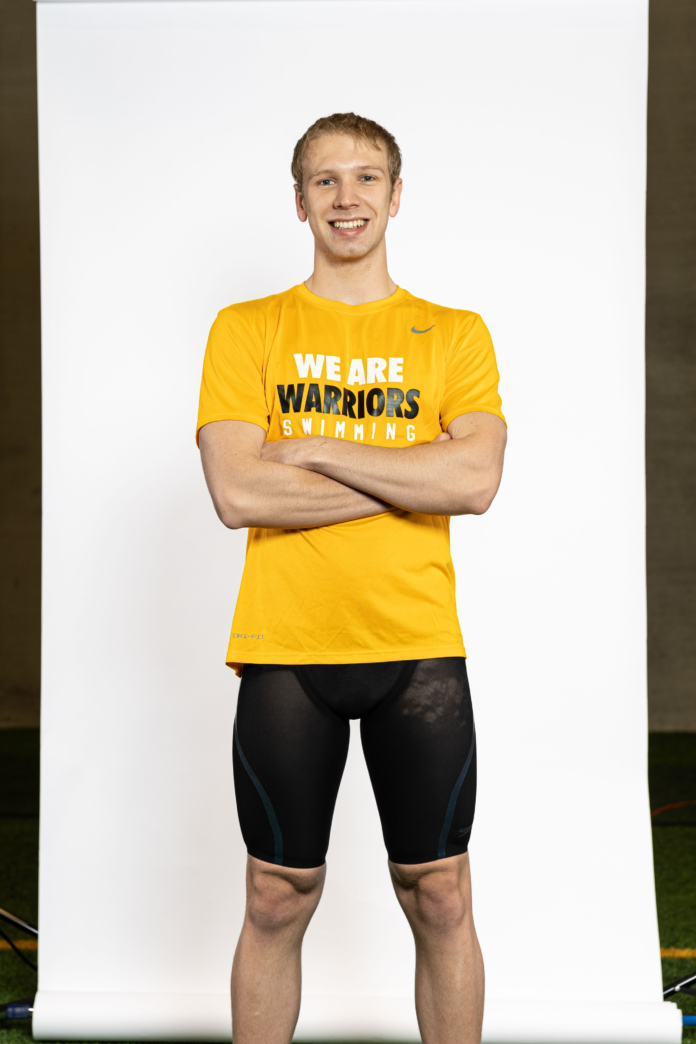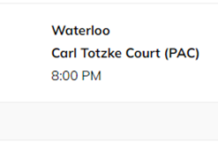Devon Miller-Junk is a fourth-year computer engineering student and one of the captains of the UW men’s varsity swim team. He swims freestyle and breaststroke and is also a Fundraising Manager on the team’s Fundraising Committee.
Miller-Junk began swimming at the age of 11 when his family moved from Canada to Puerto Rico for his father’s job. Previously, Miller-Junk had tried several sports, his favourite of which was hockey. However, in a warmer climate, hockey was no longer an option, so he turned to swimming to fulfill his athletic aspirations.
In the 10 years since he began swimming competitively, Miller-Junk has grown significantly, both as an athlete and as a student. Among the many qualities he’s gained from his swimming career thus far, Miller-Junk highlighted time management and organizational skills. “Swimming is a sport where you just have to put in the hours,” he said. “It really shows up in the results, who has been putting in those hours and putting in a lot of effort into those hours.”
Members of UW’s varsity swim team, more than half of whom are engineering students, usually attend 15 to 20 hours of team practice each week, on top of which many complete hours of additional fitness training independently. “Not only are we in the pool that many hours but we come out exhausted and we need to make sure we’re getting enough sleep at night and that we’re taking the proper time and effort to recover from all of that practice,” Miller-Junk explained. “So being able to fit in those sort of academically grueling schedules with the intense swimming schedule is pretty difficult and to me just gives you an opportunity to get better at those time management skills.”
Swimming has also improved Miller-Junk’s resourcefulness — an attribute that has benefitted him as an engineering student and as a software engineering intern in multiple co-op roles. “Swimming, I think, really taught me to find different ways to improve. You can try harder in practice, but once you really start feeling the heat, you start recognizing how to try to work smarter in practice. You can figure out a bunch of different ways to improve in the pool and outside of the pool. Especially with the different COVID-19 lockdowns, you can figure out different ways to improve even if you can’t get in the pool,” he said.
In his three-and-a-half years on the team, Miller-Junk has grown into an exceptional leader. In fall 2021, he was selected as one of the captains for the Warriors swim team. “I think of being captain as an opportunity to help serve my team in more ways than just in the pool. As a member of the varsity swim team, I can swim well and I can motivate everyone around me to also swim well — we try to always push each other in the pool. Being a captain allows me to not only do that in the pool but also gives me more opportunities to help people succeed in the pool through other means,” he said, offering the example of helping students access academic support and resources for their overall well-being.
He also highlighted the community-oriented aspects of the role. “[As captain I can] make bonding activities and opportunities for the team, so that we can become a more close-knit group and get to know each other better and support each other better.” One excellent example is through team resume critiques and interview practice, where senior students coach younger swimmers through the co-op application process.
Miller-Junk’s time on the team has reinforced the value of teamwork in his mind. “It taught me that even the most individual sport like swimming is still really group reliant, or that it’s helpful to be in a team setting. And so even if you’re struggling with something you think you should do alone, it’s really not. Everyone’s there to help you out. If you make that sort of group effort it’ll work out better.”
The team dynamic proved invaluable during the pandemic, as the athletes constantly had to adjust to new situations, with some periods when, thanks to regular testing, vaccine mandates and capacity limits, they were able to swim, and other periods when pools were entirely inaccessible. “Our team adapted really well,” Miller-Junk said proudly. “We had outdoor running groups during the summer and Zoom dryland sessions. And when we had the opportunity to swim we tried to make the most of it. It’s really been a team effort to try to keep each other in shape and keep each other motivated.”






























